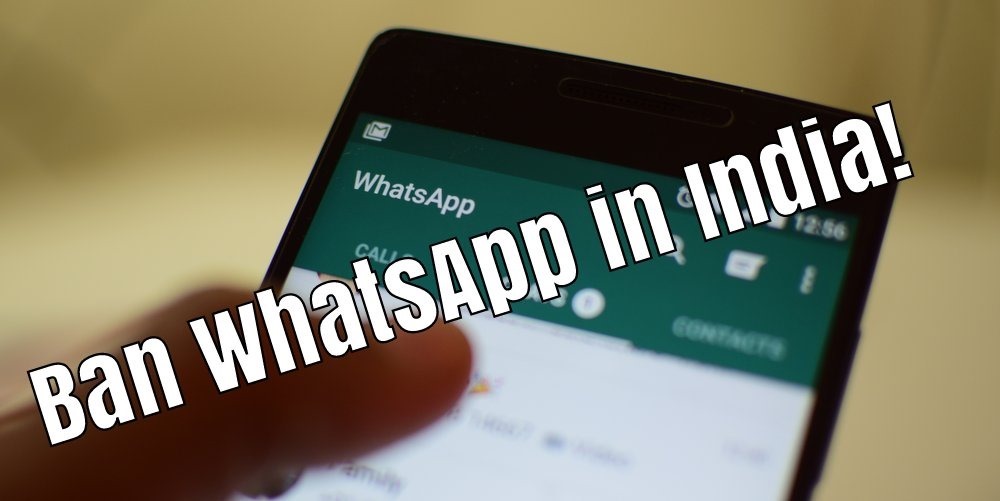Petition To Ban WhatsApp in India Filed In Supreme Court

Sudhir Yadav, an RTI Activist from Gurgaon has filed a petition in Supreme Court of India, seeking a complete ban on Whatsapp. This special petition has been filed after Whatsapp decided to encrypt all messages on its platform.
Sudhir had first requested information on Whatsapp’s encryption rules under RTI Laws; but when he was not able to get any information, he decided to knock the doors of Supreme Court seeking a ban on Whatsapp.
As per the RTI Request Registration number DOTEL/R/2016/50413, a copy of which is with us, Sudhir asked, “Kindly Provide me copy of the written permission given to WhatsApp Mobile messaging app for using the 256-bit key length encryption (or more than 40 bit key lengths) in chatting application.”
In return, he received a reply: “No such Information exist in this office.”
The Purpose of Whatsapp Ban
As per Sudhir, he wants to ban Whatsapp because they have decided to encrypt all messages exchanged on their platform; and in case any terrorist is chatting through Whatsapp and making plans to harm India, then Indian Police/Intelligence wont be able to read those messages, and take suitable action.
In other words, Whatsapp is being challenged because it’s a threat to India’s security.
We had recently covered the news that Whatsapp will now use 256 bit encryption for all messages on their platform; and the key using which these messages can be decrypted doesn’t exist. Hence, even if Whatsapp wants to decrypt any message, they can’t.
As per Sudhir, this will lead to wide scale chaos and will impound threat to India’s national security.
In his message, he says, “.. there are 115,792,089,237,316,195,423,570,985,008,687,907,853,269,984,665,640,564,039,457,584,007,913,129,639,935 possible combinations of keys to decrypt the (Whatsapp) message and to read it, which means that even if anyone have A hundred thousand super computers and each of those super computer can try a million billion keys every second, even then it will take trillions of trillions of trillions of years to decrypt a single message/document/call/video/image and then read it.”
Besides Whatsapp, the petitioner has also mentioned other messengers such as Hike, Secure Chat, LeuPost, Wicker me, Viber, Telegram etc which are using encrypted messaging, and causing ‘national threat’.
Is Whatsapp Breaking Indian Laws?
Sudhir has mentioned four laws related to Indian Constitution which are being broken by Whatsapp and other such messenger apps due to the encryption policy:
“Section 5(2) of the Indian Telegraph Act, 1885, which grants the Government the power to order the interception of messages;”
“Rule 419A of the Indian Telegraph Rules, 1951, which lays down the procedural requirements which must be followed for telephone tapping to be legal;”
“Section 69 of the Information Technology Act, 2000, which deals with the power to issue directions for interception or monitoring or decryption of any information through any computer resource;”
“Information Technology (Directions for Interception or Monitoring or Decryption of Information) Rules, 2009.”
Although the petitioner agrees that social media users need to protect their privacy and safety; but also argues that there has to be a balance between privacy and national security.
Before filing this petition at Supreme Court, Sudhir had written letters to TRAI and Ministry of Communications and IT; but received no reply.
It would be interesting to observe how Supreme Court judges this case (on merit?) and what decision the bench takes. In case the bench concludes that Whatsapp’ encryption policy is indeed breaking Indian laws, then appropriate action may be taken against them.
We will keep you updated as we receive more information about this petition.
Suggested reading: Dear WhatsApp, Your Web Feature is Gateway to Phish Personal Data of 1 Billion People

1) Details about security related measures is out of scope & definition of RTI
2) Encryption can do exist, with adhering to national security norms. In other words, decryption facilities must be disclosed to appropriate govt. authorities.
3) No news /comments from any regulatory authorities prior to this new feature opening to public remains a question.
4) At least 50/100 reading this will believe his/her messages are 100% private.
Uncertain how this should go forwards. On one hand, the government should have access with a lawful warrant. On the other hand, the only serious defense against NSA spying is strong encryption. NSA ( and doubtless other agencies) have not been using v lawful warrant procedure, so they must be locked out with strong encryption. It is a difficult dilemma.
I have more legal points to add this petition. my cell no is 09422109619.Kindly share petitioner Sudhir Yadav’a contact details. Advocate Mahendra Limaye